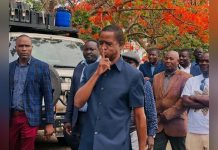Africa-Press – Zambia. Zambia’s emerging gold rush has sparked an intense debate over how the country should manage a resource many see as its next great economic lifeline. In a two-hour exchange broadcast to audiences at home and abroad, Kamfinsa MP Christopher Kang’ombe and U.S.-based Zambian economist George N. Mtonga clashed, politely but firmly, over the role of government in the gold subsector.
At stake is a strategic choice: whether Zambia should follow a Ghana-style model that centralises gold marketing under state control, or liberalise the market to allow private sector competition, while ensuring Zambians remain primary beneficiaries.
Kang’ombe argued that Zambia’s current 2.8 tonnes of gold reserves, worth roughly $300 million, are far too low to provide the economic buffer needed in times of currency volatility. He called for an expanded state role, from exploration to aggregation, with the Zambia Gold Company acting as a central buyer for artisanal and small-scale miners.
“Government is already involved,” he stressed, noting its 49% ownership via the Ministry of Finance and 51% through ZCCM-IH. His model would see all artisanal gold channelled through state aggregation before being sold to the Bank of Zambia, boosting national reserves and protecting miners from exploitative foreign buyers.
Mtonga, while supportive of building reserves, warned against over-centralisation. He cited the risk of political interference in licensing, pricing, and access to markets, drawing parallels to the Food Reserve Agency’s maize pricing system, where farmers are often forced to sell below cost.
A committed free-market advocate, Mtonga proposed a hybrid approach: keep government in exploration and regulation, but use financial markets to capitalise Zambian-owned mining companies, including floating shares on the Lusaka Stock Exchange to give citizens equity stakes.
The two men found common ground on the need to finance Zambian participation, combat smuggling, and safeguard environmental standards. But their philosophical divide remained clear, with Kang’ombe prioritising state-led ownership to prevent foreign capture, and Mtonga pressing for market competition to drive innovation and efficiency.
Listeners across Zambia, the diaspora, and the mining sector weighed in through live calls, with recurring themes of mistrust in public institutions, fears of political capture, and demands to emulate Ghana, Tanzania, and Rwanda in ring-fencing artisanal mining for citizens. Many callers backed Kang’ombe’s nationalist stance, but also echoed Mtonga’s call for institutional reform and transparent governance.
Both men agreed that Zambia’s gold could, if well-managed, generate billions, reduce dependency on IMF loans, and transform rural livelihoods. The question now is not whether to act, but whether the country can strike the right balance between state stewardship and market dynamism before another wave of resource wealth slips through its fingers.
For More News And Analysis About Zambia Follow Africa-Press







